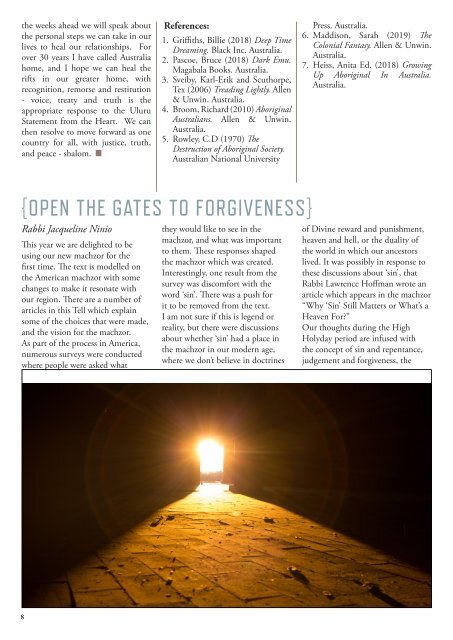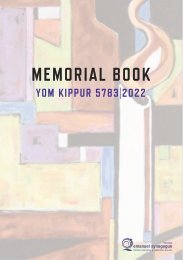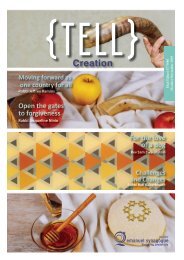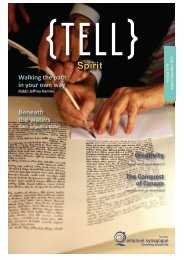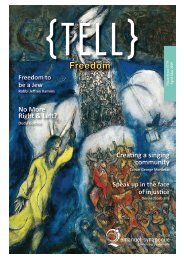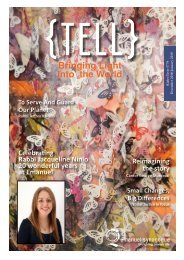TELL Magazine: October - November 2019
The magazine of Emanuel Synagogue, Sydney Australia
The magazine of Emanuel Synagogue, Sydney Australia
Create successful ePaper yourself
Turn your PDF publications into a flip-book with our unique Google optimized e-Paper software.
the weeks ahead we will speak about<br />
the personal steps we can take in our<br />
lives to heal our relationships. For<br />
over 30 years I have called Australia<br />
home, and I hope we can heal the<br />
rifts in our greater home, with<br />
recognition, remorse and restitution<br />
- voice, treaty and truth is the<br />
appropriate response to the Uluru<br />
Statement from the Heart. We can<br />
then resolve to move forward as one<br />
country for all, with justice, truth,<br />
and peace - shalom.<br />
References:<br />
1. Griffiths, Billie (2018) Deep Time<br />
Dreaming. Black Inc. Australia.<br />
2. Pascoe, Bruce (2018) Dark Emu.<br />
Magabala Books. Australia.<br />
3. Sveiby, Karl-Erik and Scuthorpe,<br />
Tex (2006) Treading Lightly. Allen<br />
& Unwin. Australia.<br />
4. Broom, Richard (2010) Aboriginal<br />
Australians. Allen & Unwin.<br />
Australia.<br />
5. Rowley, C.D (1970) The<br />
Destruction of Aboriginal Society.<br />
Australian National University<br />
Press. Australia.<br />
6. Maddison, Sarah (<strong>2019</strong>) The<br />
Colonial Fantasy. Allen & Unwin.<br />
Australia.<br />
7. Heiss, Anita Ed. (2018) Growing<br />
Up Aboriginal In Australia.<br />
Australia.<br />
{OPEN THE GATES TO FORGIVENESS}<br />
Rabbi Jacqueline Ninio<br />
This year we are delighted to be<br />
using our new machzor for the<br />
first time. The text is modelled on<br />
the American machzor with some<br />
changes to make it resonate with<br />
our region. There are a number of<br />
articles in this Tell which explain<br />
some of the choices that were made,<br />
and the vision for the machzor.<br />
As part of the process in America,<br />
numerous surveys were conducted<br />
where people were asked what<br />
they would like to see in the<br />
machzor, and what was important<br />
to them. These responses shaped<br />
the machzor which was created.<br />
Interestingly, one result from the<br />
survey was discomfort with the<br />
word ‘sin’. There was a push for<br />
it to be removed from the text.<br />
I am not sure if this is legend or<br />
reality, but there were discussions<br />
about whether ‘sin’ had a place in<br />
the machzor in our modern age,<br />
where we don’t believe in doctrines<br />
of Divine reward and punishment,<br />
heaven and hell, or the duality of<br />
the world in which our ancestors<br />
lived. It was possibly in response to<br />
these discussions about ‘sin’, that<br />
Rabbi Lawrence Hoffman wrote an<br />
article which appears in the machzor<br />
“Why ‘Sin’ Still Matters or What’s a<br />
Heaven For?”<br />
Our thoughts during the High<br />
Holyday period are infused with<br />
the concept of sin and repentance,<br />
judgement and forgiveness, the<br />
8


